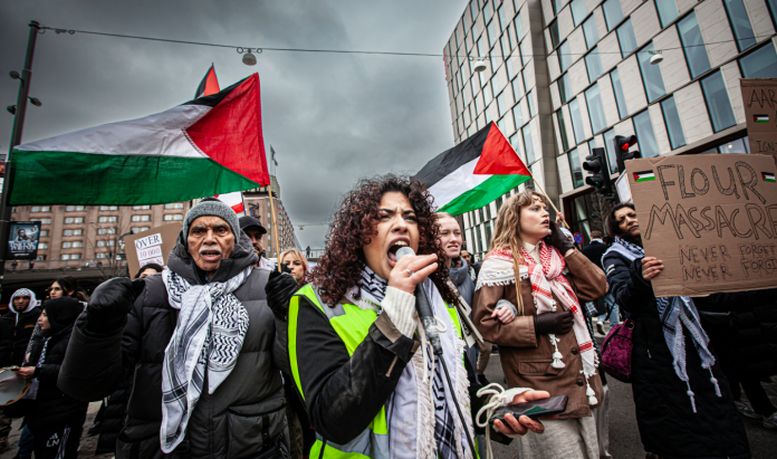Also, read and share our International Socialist Feminist Call to Action here
This year’s International Women’s Day has a very dark setting. We have a climate crisis to solve. We have hundreds of thousands of hungry little bellies to feed. But the world’s resources do not go to climate change and they do not go to saving lives. They instead turn to militarization.
Militarization means more war. War means death. War is the calculated, systematic and planned killing. The killing of hope, the killing of humanity, the killing of children.
‘Woman, life, freedom,’ was the slogan of the last 8 March that spread from Iran and around the world in 2022 when women stood up and took off their veils. But now the shawl is once again enveloping bodies, small bodies. This year we stand appalled at the images of the crying Palestinian mothers and fathers holding their dead children wrapped in sheets.
Then there is only one thing to do — we who can fight, must fight. We must fight against a capitalist system that kills children. That’s why ISA is demonstrating on International Women’s Day, 8 March, and that’s why we’re bringing everyone we know and can to the demonstrations. There are also resistance and protests daily all over the world that are silenced by the media. On International Women’s Day, women, LGBTQ+ people and all workers’ demands for justice will be heard.
70% of the victims in Gaza are women and children. Bombings of hospitals have been especially dangerous for women giving birth and children in incubators. Another reprehensible aspect of the war is the sexual abuse of Palestinian women and girls by the Israeli army as reported by the UN. Outright starvation is now spreading in northern Gaza.
War is not done purely out of malice — though the whipping up of hatred and racist dehumanisation regularly accompany imperialist onslaughts. War does not happen by chance. War is a product of the economic and political system.
The West’s interests in the Gaza war are crystal clear. Arms sales to Israel increase, aid to Palestinians is withdrawn, refugees are met by a wall and the intervention that takes place is not aimed at saving the 1.5 million starving Palestinians but at securing world trade through the Red Sea. A world trade that loots products and raw materials from poor countries to rich countries.
It is the same imperialist powers that for decades have seen Israeli capitalism with its displacements, racist constitution, occupation, annexations, wars and blockades as the “defender of democracy” in the region.
The capitalist order meant “solving” one historic crime — the Nazi holocaust of Jews — with another — 75 years of war, oppression and occupation for Palestinians. But it is capitalism itself that creates scapegoats, whips up hatred, and underpins imperialism and colonialism. The only real solution must therefore be the opposite of capitalism.
Militarization itself leads to more and more wars breaking out. Already in 2022, 237,000 people died in wars around the world. That was twice as many as the year before. During the two-year war in the Tigray region of Ethiopia, 600,000 people died and there were thousands of rapes, when rape was used as a weapon. Now Ethiopia is again threatening war — against Somalia — to support Somaliland’s demand for independence, in exchange for access to a port for trade. At the same time as the UN warns that 3 million people are in danger of ending up in a new famine disaster in Ethiopia.
There is no capitalistic war for freedom. 20 years of US war in Afghanistan led to the return of the Taliban. Now women cannot even walk outdoors or go to work without male company.
It has been two years since Russia started the war of invasion against Ukraine. Russia and Ukraine are backed by two imperialist poles, which has caused arms production in the world to go into overdrive. The figures for the number of people killed in this war of attrition without an imminent end is hidden in darkness, but it is in the hundreds of thousands. The recent Russian capture of the town of Avdiivka alone is estimated to have cost 23,000 soldiers’ lives.
The world sees a new record as the number of refugees reached 115 million in 2023. Between April and December, 7.1 million were forced to flee the civil war in Sudan. Again in this war, systematic rape is used as a weapon. The 2019 Sudanese revolution is yet another historic example of the horror that awaits if the revolutionary struggle does not succeed to overthrow the capitalist system and its exploitation and oppression.
We socialists can use the past experiences of the labor movement to understand the situation. The revolutionary leader and Russian socialist feminist Alexandra Kollontai wrote in 1915, during the raging world war, about the processes that led to that catastrophe. She explained that every capitalist is driven by the need to constantly increase their profits and that the only way is to swallow more and more. She wrote: “capital requires that the market expands, requires new places, countries, colonies into which it can invest its accumulated capitals and from which the manufacturers and industrialists can obtain ‘raw materials’ such as metal, ore and cotton, to produce goods.”
She explained that colonies and domination of the world market are the causes of the disputes that flare up among the great modern powers. How the great powers compete with each other in robbing, as they continue to do today across the neocolonial world. . “The capitalists pit the workers of one country against the workers of another country to strengthen their grip on workers all over the world. The capitalists wage war to distribute the spoils and weaken the workers through division.”
Alexandra Kollontai was a staunch socialist feminist who believed that sexism within the labor movement itself must be fiercely combated if the struggle is to have a chance of winning. Working women were organized. It was no coincidence that the Russian Revolution broke out precisely on International Women’s Day through the spontaneous strike of factory workers. The slogan was precisely “bread and peace”.
The Russian Revolution led to historic gains for women’s and LGBTQ+ rights. But later on, when the revolution remained isolated in an underdeveloped country the rise of the bureaucratic dictatorship Stalinism caused a huge backlash on all fronts. Leon Trotsky, who was the first to take up the fight against the degeneration, commented: “Guided by its conservative instinct, the bureaucracy has restored criminal punishment for abortions, officially returning women to the status of pack animals. In complete contradiction with the ABC of Communism, the ruling caste has thus restored the most reactionary and benighted nucleus of the class system, i.e., the petty-bourgeois family”. One lesson is that internationalism is a key for socialism to succeed.
Today, women workers make up the backbone of many of the most militant workers’ struggles that have swept the world in the last year — especially the huge number of strikes focussed in the health, education and social care sectors. When we celebrate 8 March, we also celebrate the history of workers’ and women’s struggle. The Russian Revolution started by the women workers continued and led to the seizure of power by the working class in October. This in turn led to the first peace treaty of the First World War.
States at war suck the energy for the war out of their own population. Russia is grappling with a declining population and is now restricting the right to abortion. What a stinking time we live in when the United States, still the most dominant power in the world, has deprived women of their fundamental right to decide over their own bodies and the “challenger”, China, has banned feminism.
In China, feminist consciousness has grown dramatically, but cannot use the “f-word” to openly identify itself due to the regime’s attacks on “anti-China” influences. Dictator Xi Jinping has launched a new campaign to “actively cultivate a new culture of marriage and childbearing”, in an attempt to head off the collapsing birthrate and demographic time bomb.
The so-called Communist Party’s ultra-capitalist policies have made China the second most expensive country in the world to raise a child.
Women and young people are increasingly rejecting the regime’s patriarchal and pro-natal propaganda. The number of marriages fell from 13.5 million in 2013 to 6.8 million in 2022. The sharply falling number of births alarms the dictatorship especially as its economy loses ground in the imperialist power struggle with US capitalism.
The rise of nationalism in the world combined with the crisis of the old parties fuels all reactionary trends. One such trend is a worryingly growing group of young men who express the idea that “equality between women and men has gone too far”. The grim picture in the UK, for example, is that men aged 16 to 29 are more negative about feminism than men over 60 are. Similar opinion polls exist in many other countries. This must be addressed. The women’s struggle must not allow itself to be silenced or to agree to the false delusions that have always been branded on women who speak out against oppression, from the days of the witch trials until today.
It is clear that when the hard core of the state is strengthened and the right moves forward, anti-feminism increases. Oppressors of women like Andrew Tate (an influencer who is currently facing charges of human trafficking, rape and organized crime) represent a particularly toxic fertilizer in the nursery for the youngest sexists. In the wake of the political reaction, increased poverty and war, sexual exploitation and men’s violence against women and gender non-conforming people are increasing.
But gender oppression is not primarily an ideology. It is deeply rooted in class society — in the exploitation of labor power, in the role of the family in the social structure, and in sexual oppression. Socialist feminism understands that the revolution required to achieve freedom must go to the bottom of the economic foundations and turn everything upside down. Only through democratic collective ownership can an economy that puts welfare first be created. In Kollontai’s words:
“In order to put an end to war, all the factories, all the plants, all the industrial enterprises must be removed from the capitalist masters: the land must be taken from the landowners, the mines from private proprietors, the banks from the capitalists, and all this wealth must become common property. In order to put an end to war, a new and more just socialist world must be won for the people, for the working class. When the people themselves control all national wealth, themselves manage the national economy and the national budget, themselves look to the needs and requirements of all the citizens, themselves strive to ensure the prosperity and wellbeing of their native land and the brotherhood of all peoples, then there will be no more wars.”
World military spending last year went up 9% compared to the previous year to an all time high of 2.2 trillion dollars. This is nearly ten times more than what is needed to eradicate hunger in the world according to the UN. Both hunger and weapons lay the ground for more wars. We need to fight for a world where what is put in the soil is seed and not mines.
Palestinian people can win liberation as part of the struggle to end imperialism. Freedom is when the people themselves own and control the land and the economy. When society is governed democratically from below and when the neighbors are democratic socialist countries able to cooperate on drawing borders, with the aim of creating a lasting peace.
It is not only misery that is growing in the world. What is also growing is the resistance. Millions of people around the world have been demonstrating against the war on Gaza. Not once but every week, especially in the Middle East. There have been strikes in West Bank. Workers in 11 Indian ports have refused to load or unload weapons to Israel.
Workers at Airbus in Spain and in ports in Italy have done the same. In Canada, protests shut down four arms factories that export to Israel. On December 7, 1,000 workers managed to block arms factories in Bournemouth, Lancashire and Brighton in England. Unions around the world have demanded a ceasefire. Students and healthcare workers are also organizing protests for Palestine.
These mass protests have now caused some states to — although mostly in words — reduce their support for Israel.
The labor struggle is on the rise in many parts of the world. In Quebec, USA, Canada, Britain, Northern Ireland, Finland, Australia there are more strikes for higher wages and better working conditions than in decades. An article in the American magazine Traveler has the headline “In the year of record hospitality strikes, women workers have taken the lead”. Strikes by housekeepers, dishwashers, and servers have taken place in hotels around the country. In November and December Quebec was rocked by the biggest strikes in the country’s history, and this in the public sector. The teachers’ strike was indefinite, and the nurses went on strike for the first time.
In early November, textile workers (mostly women) in Bangladesh shut down the industry in a week-long strike that hit clothing brands such as H&M, Zara, Walmart, and Marks and Spencer, as they demanded a tripling of their $75-a-month wages. Instead of support, they were met with police violence.
A week before 8 March this year, days of action in Nigeria embodied a growing revolt from below against outrageous price hikes on drinking water, food, transport, fuel and more. Movement for a Socialist Alternative (ISA in Nigeria) called “on workers both formal and informal, farmers, youth, students, artisans, market women & men, etc, who constitute the overwhelming majority of Nigerians to fully take part in the two days of National protest” called by the Nigeria Labour Congress. Among university students, MSA has also been part of protests against the dress code for students with females being the major target of such sexist attachment to the clothes worn by students.
Meanwhile, the last decade’s wave of feminist struggle continues, such as the women’s strike in Iceland, the Basque general strike on the International Day Against Gender Violence (November 25) and the fight against sexism in France and Italy. In Italy thousands poured into the streets in November in outrage after the murder of 22-year-old student Giulia Cecchettin, just days before her graduation. Her former boyfriend is to be charged with the murder, showing again how family relations under capitalism becomes an important part of the power structure that hold women down and is a foundation for gender-based violence.
All over the world, women in particular are fighting against cuts in healthcare, as when 10,000 demonstrated to defend the emergency hospital in Lidköping (a small town in Sweden).
Thousands demonstrated across Latin America on 28 September for abortion rights. The general strike against Javier Milei in Argentina is provoked partly by the determination to defend the newly won abortion rights and strengthened by the successes in Mexico and Colombia. In Poland, a million demonstrated against the right and the demand to dismantle the total ban on abortion is growing. The Women, Life, Freedom movement in Iran has been forced down by the brutal repression but is not defeated. The growing labor struggles, for example among steel workers, will open a second round.
All over the world we need to broaden the protests. “The free development of each is the prerequisite for the free development of all” says the Communist Manifesto. With that attitude, anti-racism and the feminist struggle need to join hands with the workers’ struggle. And the trade union and workers’ movement must itself join with and offer leadership to the fightback against all forms of oppression.
With nationalism and war propaganda comes a toxic racism that must be answered. In January, 1.5 million people demonstrated against racism in Germany, which is an inspiration for anti-racism throughout Europe to get back on its feet. The specific demands of women of color are essential for the unity and success of our whole movement. In the movement that needs to be built, total solidarity is also required for the rights of LGBTQ+ people. The specific hatred that the right pours on trans people must be met by a united multi-fold resistance and fully embraced by all feminist struggles. Horrific deaths like those of Brianna Ghey in Britain and Nex Benedict in the US have shown the deadly consequences of a whipping up of anti-trans and anti-non-binary hate by the right. Brazil has the highest number of trans people murdered in any country, 145 last year, almost half of the 321 registered in the world, with the majority of them being black trans women that do sex work. This is also a reflection of the strengthening of the extreme right and conservative right wing evangelical forces, but there is a growing fight back. In January the first national trans march was held in the capital Brasília.
So we have a long fight ahead of us. Everything we do today has significance for future struggles and generations. The struggle needs to be democratically organized and armed with a revolutionary socialist program against oppression. We will not stop at the demonstrations on International Women’s Day. But we start there. Long live 8 March.
International Socialist Alternative calls for:
- Stop the war on Gaza. Stop the occupation and the blockade. For a free socialist Palestine and a socialist Israel in a socialist Middle East.
- Support for all civilian victims of terror and state terror. For international struggle against war — working women in Ukraine and Russia, in Sudan, Ethiopia, China, USA and all the world, unite against war and imperialism. Scrap the arms industry. For the right to asylum for refugees.
- For full sexual and reproductive rights — adequate resources for sex education, contraception and access to free and safe abortions. Economic and social conditions for everyone to give children a safe life without poverty.
- Put people before profit — defend and strengthen welfare and public services No to privatizations. Major upgrading of healthcare, schools and elderly care. Expanded welfare increases gender equality.
- For an end to violence against women and for an end to all forms of LGBTQ+phobia including transphobia — for an immediate increase in public spending against gender violence. Care and support for all victims of sexual violence.
- For democratic and combative unions that fight to give workers full compensation for the cost of living crisis. Abolish wage and other workplace discrimination against women and gender non-conforming people. For a living wage, secure and good jobs for all people and everyone’s right to good housing to ensure everyone’s opportunity for an independent life.
- Build a fighting socialist-feminist movement that mobilizes against gender, racial and all forms of oppression. Strikes and united mass struggle of the multi-gendered, multi-racial working class are the methods that can win.
- For the abolition of social inequalities — only if we own the economy can we stop exploitation! Nationalization of the biggest companies and monopolies — the economy must be governed under the democratic control of the working class.
- For a dignified life without violence and with full rights — while fighting for every grain of improvement in today’s capitalist world we are aware that to achieve real and complete equality, we need the overthrow of capitalism!
- For a green, socialist, just planned transition to stop the climate crisis. Common ownership of the land and forest. Organic, collective farming. Everyone has the right to clean water, nutritious food and sanitary rights.
- For a socialist world of peace and freedom which can lay the foundation for all forms of oppression are abolished. A society which would be governed democratically from below with a focus on welfare for all and in harmony with nature.




